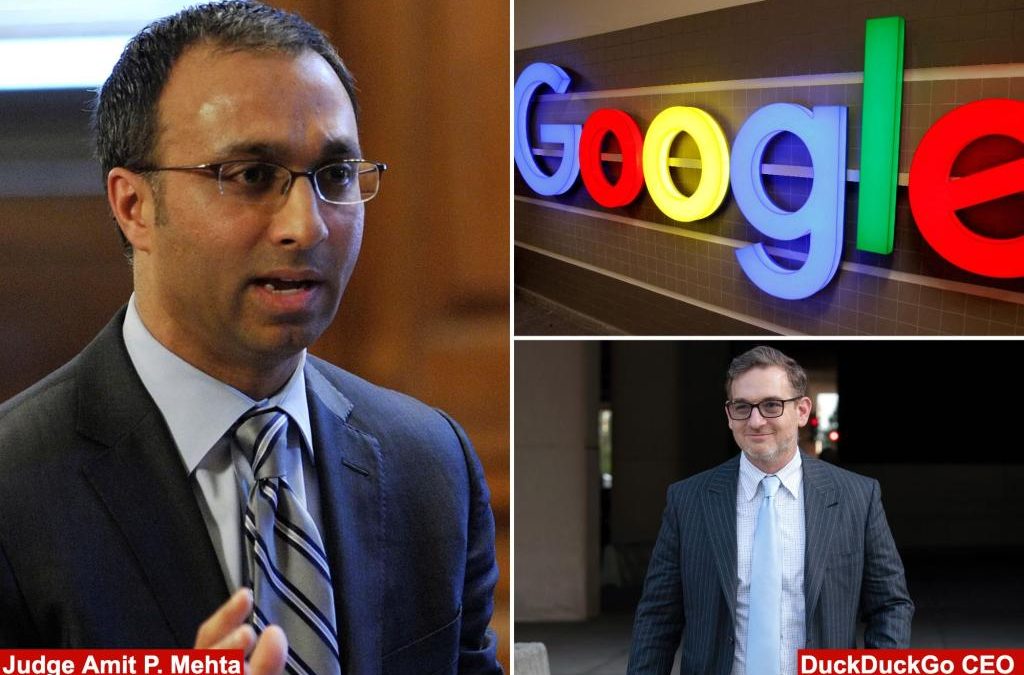The judge overseeing Google’s landmark antitrust case unsealed closed-door testimony from two key witnesses, potentially marking his latest move to address criticism that the once-in-a-generation trial has been too secretive.
After facing backlash from frustrated antitrust advocates over a lack of public access, Judge Amit Mehta ordered the release of large chunks of remarks made by DuckDuckGO CEO Gabriel Weinberg and Apple AI boss John Giannandrea on the stand.
Mehta said he reviewed the transcripts “line-by-line,” alongside redaction requests from the companies involved, before deciding what to release.
Partial transcripts from other notable witnesses, including Apple services chief Eddy Cue, will also be released, the judge revealed.
The judge’s decision to release more sealed testimony is a “solid start,” according to Joel Thayer, an attorney for two nonprofits that staged an unsuccessful bid in DC federal court to make all exhibits about Google’s relationship with Apple publicly available.
“My hope is that the parties don’t have the opportunity to make further redactions,” Thayer told The Post.
“In short, I think this is fairly responsive to our motion, but whether we get more transparency depends on how much deference Judge Mehta gives the parties challenging the DoJ’s public posting,” he added.
The court has not held a single closed-door session this week – a major reversal from the trial’s early days, when key witnesses frequently disappeared from public view to discuss sensitive information, according to the Big Tech on Trial newsletter.
Justice Department attorneys have argued that Google pays more than $10 billion per year to smartphone makers and mobile carriers to keep its search engine as the default option on most devices.
The feds say the strategy has illegally suppressed competition and allowed Google to maintain a dominant 90% market share.
Google asserts the payments are fair compensation to its partners and that customers choose to use its search engine because it is the best product of its kind on the market.
Google’s lawyers have fought hard to keep certain documents and testimony under wraps during the trial because they allegedly contained sensitive information about internal operations or trade secrets.
In one case, Google tried to block the release of a 2017 document in which Michael Roszak, the company’s vice president for finance, wrote that “search advertising is one of the world’s greatest business models ever created,” adding that only “illicit businesses (cigarettes or drugs) that could rival these economics.”
The Post has reached out to Google, Apple and DuckDuckGo for comment.
The unsealed testimony from DuckDuckGo’s Weinberg and Apple’s Giannanadrea contained revelations that would have otherwise evaded public scrutiny.
For example, Weinberg testified that his team held extensive meetings and phone calls with top Apple executives in 2018 and 2019 about making DuckDuckGo’s privacy-focused search engine the default setting for the private mode of Apple’s Safari browser, Bloomberg reported.
“We were talking about it, I thought they would launch it,” Weinberg said.
Giannandrea, who formerly served as Apple’s head of search, wrote in February 2019 that he felt it was “probably a bad idea” for the company to use DuckDuckGo as the default search engine on Safari’s private browsing function.
Ultimately, Apple decided to retain Google as its default search engine partner.
Last week, Mehta ruled that the DOJ could publish trial exhibits on a publicly available website.
However, Google and Apple are allowed to contest which items are revealed and which remain under seal.
Mehta will ultimately decide the outcome of the case.
Source




